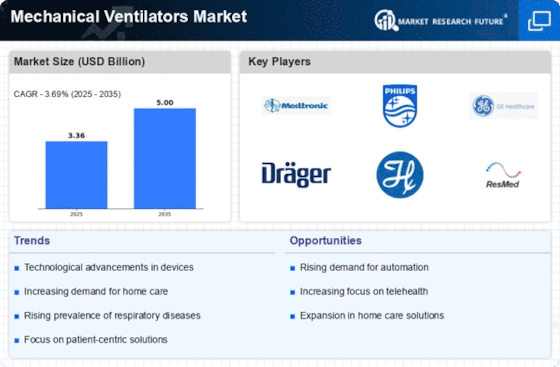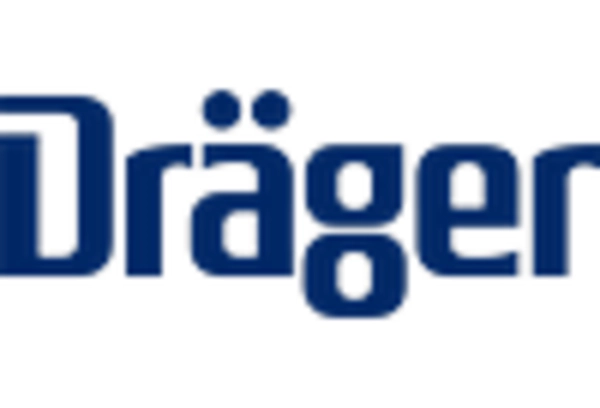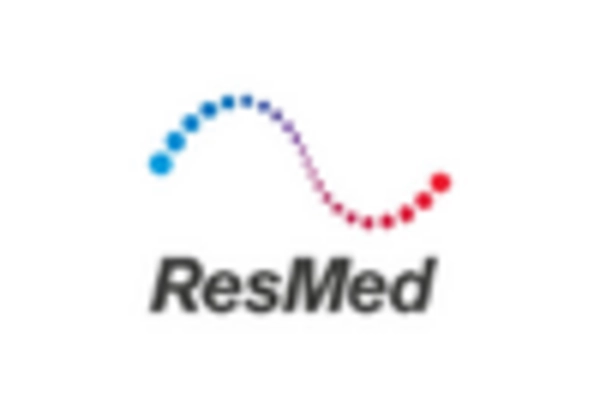Conventional Mechanical Ventilators
Portable Mechanical Ventilators
High-Frequency Ventilators
Bi-level Positive Airway Pressure Ventilators
Volume-Controlled
Pressure-Controlled
Dual-Controlled
Assist-Controlled
Hospitals
Home Care Settings
Ambulatory Surgical Centers
Long-term Care Facilities
Emergency Care
Chronic Respiratory Diseases
Anesthesia
Neonatal Care
North America
Europe
South America
Asia Pacific
Middle East and Africa
North America Outlook (USD Billion, 2019-2035)
North America Mechanical Ventilators Market by Product Type
Conventional Mechanical Ventilators
Portable Mechanical Ventilators
High-Frequency Ventilators
Bi-level Positive Airway Pressure Ventilators
North America Mechanical Ventilators Market by Mode of Operation Type
Volume-Controlled
Pressure-Controlled
Dual-Controlled
Assist-Controlled
North America Mechanical Ventilators Market by End User Type
Hospitals
Home Care Settings
Ambulatory Surgical Centers
Long-term Care Facilities
North America Mechanical Ventilators Market by Application Type
Emergency Care
Chronic Respiratory Diseases
Anesthesia
Neonatal Care
North America Mechanical Ventilators Market by Regional Type
US
Canada
US Outlook (USD Billion, 2019-2035)
US Mechanical Ventilators Market by Product Type
Conventional Mechanical Ventilators
Portable Mechanical Ventilators
High-Frequency Ventilators
Bi-level Positive Airway Pressure Ventilators
US Mechanical Ventilators Market by Mode of Operation Type
Volume-Controlled
Pressure-Controlled
Dual-Controlled
Assist-Controlled
US Mechanical Ventilators Market by End User Type
Hospitals
Home Care Settings
Ambulatory Surgical Centers
Long-term Care Facilities
US Mechanical Ventilators Market by Application Type
Emergency Care
Chronic Respiratory Diseases
Anesthesia
Neonatal Care
CANADA Outlook (USD Billion, 2019-2035)
CANADA Mechanical Ventilators Market by Product Type
Conventional Mechanical Ventilators
Portable Mechanical Ventilators
High-Frequency Ventilators
Bi-level Positive Airway Pressure Ventilators
CANADA Mechanical Ventilators Market by Mode of Operation Type
Volume-Controlled
Pressure-Controlled
Dual-Controlled
Assist-Controlled
CANADA Mechanical Ventilators Market by End User Type
Hospitals
Home Care Settings
Ambulatory Surgical Centers
Long-term Care Facilities
CANADA Mechanical Ventilators Market by Application Type
Emergency Care
Chronic Respiratory Diseases
Anesthesia
Neonatal Care
Europe Outlook (USD Billion, 2019-2035)
Europe Mechanical Ventilators Market by Product Type
Conventional Mechanical Ventilators
Portable Mechanical Ventilators
High-Frequency Ventilators
Bi-level Positive Airway Pressure Ventilators
Europe Mechanical Ventilators Market by Mode of Operation Type
Volume-Controlled
Pressure-Controlled
Dual-Controlled
Assist-Controlled
Europe Mechanical Ventilators Market by End User Type
Hospitals
Home Care Settings
Ambulatory Surgical Centers
Long-term Care Facilities
Europe Mechanical Ventilators Market by Application Type
Emergency Care
Chronic Respiratory Diseases
Anesthesia
Neonatal Care
Europe Mechanical Ventilators Market by Regional Type
Germany
UK
France
Russia
Italy
Spain
Rest of Europe
GERMANY Outlook (USD Billion, 2019-2035)
GERMANY Mechanical Ventilators Market by Product Type
Conventional Mechanical Ventilators
Portable Mechanical Ventilators
High-Frequency Ventilators
Bi-level Positive Airway Pressure Ventilators
GERMANY Mechanical Ventilators Market by Mode of Operation Type
Volume-Controlled
Pressure-Controlled
Dual-Controlled
Assist-Controlled
GERMANY Mechanical Ventilators Market by End User Type
Hospitals
Home Care Settings
Ambulatory Surgical Centers
Long-term Care Facilities
GERMANY Mechanical Ventilators Market by Application Type
Emergency Care
Chronic Respiratory Diseases
Anesthesia
Neonatal Care
UK Outlook (USD Billion, 2019-2035)
UK Mechanical Ventilators Market by Product Type
Conventional Mechanical Ventilators
Portable Mechanical Ventilators
High-Frequency Ventilators
Bi-level Positive Airway Pressure Ventilators
UK Mechanical Ventilators Market by Mode of Operation Type
Volume-Controlled
Pressure-Controlled
Dual-Controlled
Assist-Controlled
UK Mechanical Ventilators Market by End User Type
Hospitals
Home Care Settings
Ambulatory Surgical Centers
Long-term Care Facilities
UK Mechanical Ventilators Market by Application Type
Emergency Care
Chronic Respiratory Diseases
Anesthesia
Neonatal Care
FRANCE Outlook (USD Billion, 2019-2035)
FRANCE Mechanical Ventilators Market by Product Type
Conventional Mechanical Ventilators
Portable Mechanical Ventilators
High-Frequency Ventilators
Bi-level Positive Airway Pressure Ventilators
FRANCE Mechanical Ventilators Market by Mode of Operation Type
Volume-Controlled
Pressure-Controlled
Dual-Controlled
Assist-Controlled
FRANCE Mechanical Ventilators Market by End User Type
Hospitals
Home Care Settings
Ambulatory Surgical Centers
Long-term Care Facilities
FRANCE Mechanical Ventilators Market by Application Type
Emergency Care
Chronic Respiratory Diseases
Anesthesia
Neonatal Care
RUSSIA Outlook (USD Billion, 2019-2035)
RUSSIA Mechanical Ventilators Market by Product Type
Conventional Mechanical Ventilators
Portable Mechanical Ventilators
High-Frequency Ventilators
Bi-level Positive Airway Pressure Ventilators
RUSSIA Mechanical Ventilators Market by Mode of Operation Type
Volume-Controlled
Pressure-Controlled
Dual-Controlled
Assist-Controlled
RUSSIA Mechanical Ventilators Market by End User Type
Hospitals
Home Care Settings
Ambulatory Surgical Centers
Long-term Care Facilities
RUSSIA Mechanical Ventilators Market by Application Type
Emergency Care
Chronic Respiratory Diseases
Anesthesia
Neonatal Care
ITALY Outlook (USD Billion, 2019-2035)
ITALY Mechanical Ventilators Market by Product Type
Conventional Mechanical Ventilators
Portable Mechanical Ventilators
High-Frequency Ventilators
Bi-level Positive Airway Pressure Ventilators
ITALY Mechanical Ventilators Market by Mode of Operation Type
Volume-Controlled
Pressure-Controlled
Dual-Controlled
Assist-Controlled
ITALY Mechanical Ventilators Market by End User Type
Hospitals
Home Care Settings
Ambulatory Surgical Centers
Long-term Care Facilities
ITALY Mechanical Ventilators Market by Application Type
Emergency Care
Chronic Respiratory Diseases
Anesthesia
Neonatal Care
SPAIN Outlook (USD Billion, 2019-2035)
SPAIN Mechanical Ventilators Market by Product Type
Conventional Mechanical Ventilators
Portable Mechanical Ventilators
High-Frequency Ventilators
Bi-level Positive Airway Pressure Ventilators
SPAIN Mechanical Ventilators Market by Mode of Operation Type
Volume-Controlled
Pressure-Controlled
Dual-Controlled
Assist-Controlled
SPAIN Mechanical Ventilators Market by End User Type
Hospitals
Home Care Settings
Ambulatory Surgical Centers
Long-term Care Facilities
SPAIN Mechanical Ventilators Market by Application Type
Emergency Care
Chronic Respiratory Diseases
Anesthesia
Neonatal Care
REST OF EUROPE Outlook (USD Billion, 2019-2035)
REST OF EUROPE Mechanical Ventilators Market by Product Type
Conventional Mechanical Ventilators
Portable Mechanical Ventilators
High-Frequency Ventilators
Bi-level Positive Airway Pressure Ventilators
REST OF EUROPE Mechanical Ventilators Market by Mode of Operation Type
Volume-Controlled
Pressure-Controlled
Dual-Controlled
Assist-Controlled
REST OF EUROPE Mechanical Ventilators Market by End User Type
Hospitals
Home Care Settings
Ambulatory Surgical Centers
Long-term Care Facilities
REST OF EUROPE Mechanical Ventilators Market by Application Type
Emergency Care
Chronic Respiratory Diseases
Anesthesia
Neonatal Care
APAC Outlook (USD Billion, 2019-2035)
APAC Mechanical Ventilators Market by Product Type
Conventional Mechanical Ventilators
Portable Mechanical Ventilators
High-Frequency Ventilators
Bi-level Positive Airway Pressure Ventilators
APAC Mechanical Ventilators Market by Mode of Operation Type
Volume-Controlled
Pressure-Controlled
Dual-Controlled
Assist-Controlled
APAC Mechanical Ventilators Market by End User Type
Hospitals
Home Care Settings
Ambulatory Surgical Centers
Long-term Care Facilities
APAC Mechanical Ventilators Market by Application Type
Emergency Care
Chronic Respiratory Diseases
Anesthesia
Neonatal Care
APAC Mechanical Ventilators Market by Regional Type
China
India
Japan
South Korea
Malaysia
Thailand
Indonesia
Rest of APAC
CHINA Outlook (USD Billion, 2019-2035)
CHINA Mechanical Ventilators Market by Product Type
Conventional Mechanical Ventilators
Portable Mechanical Ventilators
High-Frequency Ventilators
Bi-level Positive Airway Pressure Ventilators
CHINA Mechanical Ventilators Market by Mode of Operation Type
Volume-Controlled
Pressure-Controlled
Dual-Controlled
Assist-Controlled
CHINA Mechanical Ventilators Market by End User Type
Hospitals
Home Care Settings
Ambulatory Surgical Centers
Long-term Care Facilities
CHINA Mechanical Ventilators Market by Application Type
Emergency Care
Chronic Respiratory Diseases
Anesthesia
Neonatal Care
INDIA Outlook (USD Billion, 2019-2035)
INDIA Mechanical Ventilators Market by Product Type
Conventional Mechanical Ventilators
Portable Mechanical Ventilators
High-Frequency Ventilators
Bi-level Positive Airway Pressure Ventilators
INDIA Mechanical Ventilators Market by Mode of Operation Type
Volume-Controlled
Pressure-Controlled
Dual-Controlled
Assist-Controlled
INDIA Mechanical Ventilators Market by End User Type
Hospitals
Home Care Settings
Ambulatory Surgical Centers
Long-term Care Facilities
INDIA Mechanical Ventilators Market by Application Type
Emergency Care
Chronic Respiratory Diseases
Anesthesia
Neonatal Care
JAPAN Outlook (USD Billion, 2019-2035)
JAPAN Mechanical Ventilators Market by Product Type
Conventional Mechanical Ventilators
Portable Mechanical Ventilators
High-Frequency Ventilators
Bi-level Positive Airway Pressure Ventilators
JAPAN Mechanical Ventilators Market by Mode of Operation Type
Volume-Controlled
Pressure-Controlled
Dual-Controlled
Assist-Controlled
JAPAN Mechanical Ventilators Market by End User Type
Hospitals
Home Care Settings
Ambulatory Surgical Centers
Long-term Care Facilities
JAPAN Mechanical Ventilators Market by Application Type
Emergency Care
Chronic Respiratory Diseases
Anesthesia
Neonatal Care
SOUTH KOREA Outlook (USD Billion, 2019-2035)
SOUTH KOREA Mechanical Ventilators Market by Product Type
Conventional Mechanical Ventilators
Portable Mechanical Ventilators
High-Frequency Ventilators
Bi-level Positive Airway Pressure Ventilators
SOUTH KOREA Mechanical Ventilators Market by Mode of Operation Type
Volume-Controlled
Pressure-Controlled
Dual-Controlled
Assist-Controlled
SOUTH KOREA Mechanical Ventilators Market by End User Type
Hospitals
Home Care Settings
Ambulatory Surgical Centers
Long-term Care Facilities
SOUTH KOREA Mechanical Ventilators Market by Application Type
Emergency Care
Chronic Respiratory Diseases
Anesthesia
Neonatal Care
MALAYSIA Outlook (USD Billion, 2019-2035)
MALAYSIA Mechanical Ventilators Market by Product Type
Conventional Mechanical Ventilators
Portable Mechanical Ventilators
High-Frequency Ventilators
Bi-level Positive Airway Pressure Ventilators
MALAYSIA Mechanical Ventilators Market by Mode of Operation Type
Volume-Controlled
Pressure-Controlled
Dual-Controlled
Assist-Controlled
MALAYSIA Mechanical Ventilators Market by End User Type
Hospitals
Home Care Settings
Ambulatory Surgical Centers
Long-term Care Facilities
MALAYSIA Mechanical Ventilators Market by Application Type
Emergency Care
Chronic Respiratory Diseases
Anesthesia
Neonatal Care
THAILAND Outlook (USD Billion, 2019-2035)
THAILAND Mechanical Ventilators Market by Product Type
Conventional Mechanical Ventilators
Portable Mechanical Ventilators
High-Frequency Ventilators
Bi-level Positive Airway Pressure Ventilators
THAILAND Mechanical Ventilators Market by Mode of Operation Type
Volume-Controlled
Pressure-Controlled
Dual-Controlled
Assist-Controlled
THAILAND Mechanical Ventilators Market by End User Type
Hospitals
Home Care Settings
Ambulatory Surgical Centers
Long-term Care Facilities
THAILAND Mechanical Ventilators Market by Application Type
Emergency Care
Chronic Respiratory Diseases
Anesthesia
Neonatal Care
INDONESIA Outlook (USD Billion, 2019-2035)
INDONESIA Mechanical Ventilators Market by Product Type
Conventional Mechanical Ventilators
Portable Mechanical Ventilators
High-Frequency Ventilators
Bi-level Positive Airway Pressure Ventilators
INDONESIA Mechanical Ventilators Market by Mode of Operation Type
Volume-Controlled
Pressure-Controlled
Dual-Controlled
Assist-Controlled
INDONESIA Mechanical Ventilators Market by End User Type
Hospitals
Home Care Settings
Ambulatory Surgical Centers
Long-term Care Facilities
INDONESIA Mechanical Ventilators Market by Application Type
Emergency Care
Chronic Respiratory Diseases
Anesthesia
Neonatal Care
REST OF APAC Outlook (USD Billion, 2019-2035)
REST OF APAC Mechanical Ventilators Market by Product Type
Conventional Mechanical Ventilators
Portable Mechanical Ventilators
High-Frequency Ventilators
Bi-level Positive Airway Pressure Ventilators
REST OF APAC Mechanical Ventilators Market by Mode of Operation Type
Volume-Controlled
Pressure-Controlled
Dual-Controlled
Assist-Controlled
REST OF APAC Mechanical Ventilators Market by End User Type
Hospitals
Home Care Settings
Ambulatory Surgical Centers
Long-term Care Facilities
REST OF APAC Mechanical Ventilators Market by Application Type
Emergency Care
Chronic Respiratory Diseases
Anesthesia
Neonatal Care
South America Outlook (USD Billion, 2019-2035)
South America Mechanical Ventilators Market by Product Type
Conventional Mechanical Ventilators
Portable Mechanical Ventilators
High-Frequency Ventilators
Bi-level Positive Airway Pressure Ventilators
South America Mechanical Ventilators Market by Mode of Operation Type
Volume-Controlled
Pressure-Controlled
Dual-Controlled
Assist-Controlled
South America Mechanical Ventilators Market by End User Type
Hospitals
Home Care Settings
Ambulatory Surgical Centers
Long-term Care Facilities
South America Mechanical Ventilators Market by Application Type
Emergency Care
Chronic Respiratory Diseases
Anesthesia
Neonatal Care
South America Mechanical Ventilators Market by Regional Type
Brazil
Mexico
Argentina
Rest of South America
BRAZIL Outlook (USD Billion, 2019-2035)
BRAZIL Mechanical Ventilators Market by Product Type
Conventional Mechanical Ventilators
Portable Mechanical Ventilators
High-Frequency Ventilators
Bi-level Positive Airway Pressure Ventilators
BRAZIL Mechanical Ventilators Market by Mode of Operation Type
Volume-Controlled
Pressure-Controlled
Dual-Controlled
Assist-Controlled
BRAZIL Mechanical Ventilators Market by End User Type
Hospitals
Home Care Settings
Ambulatory Surgical Centers
Long-term Care Facilities
BRAZIL Mechanical Ventilators Market by Application Type
Emergency Care
Chronic Respiratory Diseases
Anesthesia
Neonatal Care
MEXICO Outlook (USD Billion, 2019-2035)
MEXICO Mechanical Ventilators Market by Product Type
Conventional Mechanical Ventilators
Portable Mechanical Ventilators
High-Frequency Ventilators
Bi-level Positive Airway Pressure Ventilators
MEXICO Mechanical Ventilators Market by Mode of Operation Type
Volume-Controlled
Pressure-Controlled
Dual-Controlled
Assist-Controlled
MEXICO Mechanical Ventilators Market by End User Type
Hospitals
Home Care Settings
Ambulatory Surgical Centers
Long-term Care Facilities
MEXICO Mechanical Ventilators Market by Application Type
Emergency Care
Chronic Respiratory Diseases
Anesthesia
Neonatal Care
ARGENTINA Outlook (USD Billion, 2019-2035)
ARGENTINA Mechanical Ventilators Market by Product Type
Conventional Mechanical Ventilators
Portable Mechanical Ventilators
High-Frequency Ventilators
Bi-level Positive Airway Pressure Ventilators
ARGENTINA Mechanical Ventilators Market by Mode of Operation Type
Volume-Controlled
Pressure-Controlled
Dual-Controlled
Assist-Controlled
ARGENTINA Mechanical Ventilators Market by End User Type
Hospitals
Home Care Settings
Ambulatory Surgical Centers
Long-term Care Facilities
ARGENTINA Mechanical Ventilators Market by Application Type
Emergency Care
Chronic Respiratory Diseases
Anesthesia
Neonatal Care
REST OF SOUTH AMERICA Outlook (USD Billion, 2019-2035)
REST OF SOUTH AMERICA Mechanical Ventilators Market by Product Type
Conventional Mechanical Ventilators
Portable Mechanical Ventilators
High-Frequency Ventilators
Bi-level Positive Airway Pressure Ventilators
REST OF SOUTH AMERICA Mechanical Ventilators Market by Mode of Operation Type
Volume-Controlled
Pressure-Controlled
Dual-Controlled
Assist-Controlled
REST OF SOUTH AMERICA Mechanical Ventilators Market by End User Type
Hospitals
Home Care Settings
Ambulatory Surgical Centers
Long-term Care Facilities
REST OF SOUTH AMERICA Mechanical Ventilators Market by Application Type
Emergency Care
Chronic Respiratory Diseases
Anesthesia
Neonatal Care
MEA Outlook (USD Billion, 2019-2035)
MEA Mechanical Ventilators Market by Product Type
Conventional Mechanical Ventilators
Portable Mechanical Ventilators
High-Frequency Ventilators
Bi-level Positive Airway Pressure Ventilators
MEA Mechanical Ventilators Market by Mode of Operation Type
Volume-Controlled
Pressure-Controlled
Dual-Controlled
Assist-Controlled
MEA Mechanical Ventilators Market by End User Type
Hospitals
Home Care Settings
Ambulatory Surgical Centers
Long-term Care Facilities
MEA Mechanical Ventilators Market by Application Type
Emergency Care
Chronic Respiratory Diseases
Anesthesia
Neonatal Care
MEA Mechanical Ventilators Market by Regional Type
GCC Countries
South Africa
Rest of MEA
GCC COUNTRIES Outlook (USD Billion, 2019-2035)
GCC COUNTRIES Mechanical Ventilators Market by Product Type
Conventional Mechanical Ventilators
Portable Mechanical Ventilators
High-Frequency Ventilators
Bi-level Positive Airway Pressure Ventilators
GCC COUNTRIES Mechanical Ventilators Market by Mode of Operation Type
Volume-Controlled
Pressure-Controlled
Dual-Controlled
Assist-Controlled
GCC COUNTRIES Mechanical Ventilators Market by End User Type
Hospitals
Home Care Settings
Ambulatory Surgical Centers
Long-term Care Facilities
GCC COUNTRIES Mechanical Ventilators Market by Application Type
Emergency Care
Chronic Respiratory Diseases
Anesthesia
Neonatal Care
SOUTH AFRICA Outlook (USD Billion, 2019-2035)
SOUTH AFRICA Mechanical Ventilators Market by Product Type
Conventional Mechanical Ventilators
Portable Mechanical Ventilators
High-Frequency Ventilators
Bi-level Positive Airway Pressure Ventilators
SOUTH AFRICA Mechanical Ventilators Market by Mode of Operation Type
Volume-Controlled
Pressure-Controlled
Dual-Controlled
Assist-Controlled
SOUTH AFRICA Mechanical Ventilators Market by End User Type
Hospitals
Home Care Settings
Ambulatory Surgical Centers
Long-term Care Facilities
SOUTH AFRICA Mechanical Ventilators Market by Application Type
Emergency Care
Chronic Respiratory Diseases
Anesthesia
Neonatal Care
REST OF MEA Outlook (USD Billion, 2019-2035)
REST OF MEA Mechanical Ventilators Market by Product Type
Conventional Mechanical Ventilators
Portable Mechanical Ventilators
High-Frequency Ventilators
Bi-level Positive Airway Pressure Ventilators
REST OF MEA Mechanical Ventilators Market by Mode of Operation Type
Volume-Controlled
Pressure-Controlled
Dual-Controlled
Assist-Controlled
REST OF MEA Mechanical Ventilators Market by End User Type
Hospitals
Home Care Settings
Ambulatory Surgical Centers
Long-term Care Facilities
REST OF MEA Mechanical Ventilators Market by Application Type
Emergency Care
Chronic Respiratory Diseases
Anesthesia
Neonatal Care


















Leave a Comment